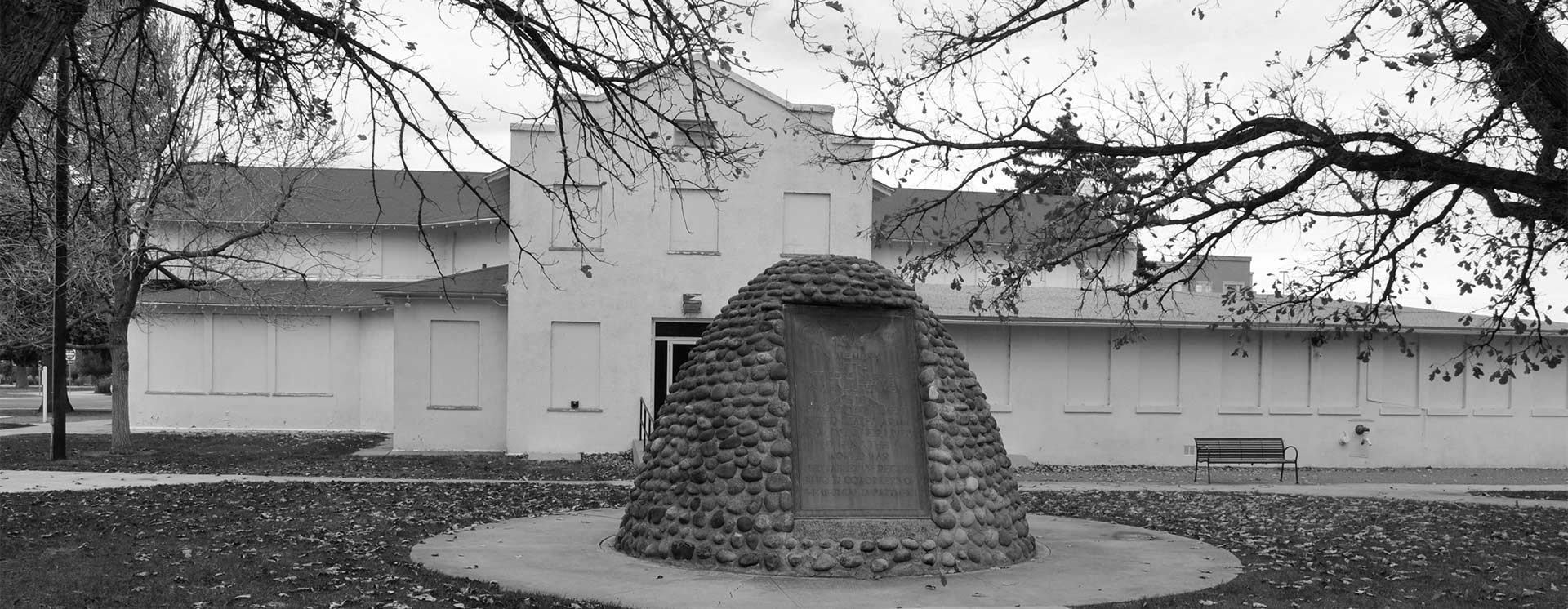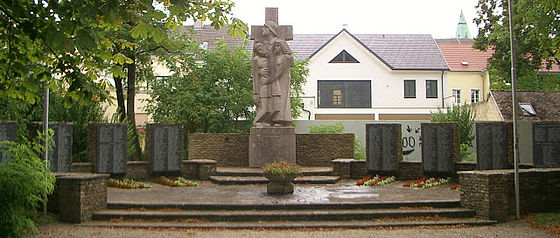
World War One Sites - The NETWORLD Database
War monument and Amstetten “Iron Soldier”, Lower Austria, Austria
The Iron Soldier was set up in 1915 on the main square in Amstetten on the initiative of the “Eiserner Wehrmann” association to collect funds for war widows and orphans. People making a donation were allowed to hammer a nail into the figure. Following World War One, the iron soldier was taken away from the main square and kept in storage. Today the figure is located in the town archives of Amstetten.
The war monument (designed by Kunibert Zinner) was created in 1960 on the initiative of the Austrian comradeship organisation, subgroup Amstetten, in memory of soldiers who fell in World War One and Two.
Austria, Lower Austria
Type of WWI-heritage
- War monument
- Non-Military Site of World War One Relevance
Dimensions
The Iron Soldier has a height of approximately two metres.
State of repair/preservation
The war monument and the Iron Soldier are in good condition.
Historical WWI Context
A war monument was created in 1960 on the initiative of the Austrian comradeship organisation, subgroup Amstetten, in memory of soldiers who fell in World War One and Two. The design was by Kunibert Zinner.
From spring of 1915, many towns and villages in the Austro-Hungarian monarchy set up wooden figures to be decorated with nails if a donation was given to the war welfare fund. The initial impulse for this was supplied by the “soldier in iron” presented in Vienna on 6 March 1915. In addition to soldiers, military signs and crosses, other objects were also used for nailing purposes, e.g. figures of historical personages, smithies, holy figures and animals as well as tables and doors.
The number of nailing actions suddenly increased from April 1915 – they also fulfilled an important social function by appealing to the common call for holding out. The time between July 1915 and April/May 1916 was deemed to be the “zenith” of these nailing campaigns.
According to a source of the time, around 700 iron soldier and iron sign campaigns were carried out in Austria up to June 1916. This was also the case in Amstetten where the town set up an iron soldier on its main square on the initiative of the “Eiserner Wehrmann” association. Following World War One, the two-metre high iron soldier was taken away from the main square and kept in storage. Today it is located in the town archives of Amstetten.
State of legal protection
The war monument and Iron Soldier are not heritage-protected.
Owner
The Amstetten borough council takes care of constructional preservation of the war memorial and Iron Soldier.
Kind of cultural use of WWI
The war memorial and Iron Soldier currently housed by the Amstetten town archives are publicly accessible. The war memorial can also be viewed as part of the town tour.
Further information:
Town Archive Amstetten: www.amstetten.at/Stadtarchiv.147.0.html
Opening
The war memorial and Iron Soldier currently housed by the Amstetten town archives are publicly accessible. The war memorial can also be viewed as part of the town tour.
Further information:
Town Archive Amstetten: www.amstetten.at/Stadtarchiv.147.0.html
Entrance Fee
The war memorial is accessible for free. The Iron Soldier is located at the Amstetten town archive.
Information regarding cities, villages, other touristic attractions (non-WWI) nearby
Further information:
Basilica Sonntagberg: www.sonntagberg.at
City of Waidhofen/Ybbs: waidhofen.at
Wachau: http://wachau-urlaub.com/
Accomodation
Further information:
City of Amstetten: www.amstetten.noe.gv.at/Hotels-und-Unterkuenfte.237.0.html
Wachau: http://wachau-urlaub.com/
Public Transport
Further information sources
Publications:
Achim Doppler, Stefan Eminger & Elisabeth Loinig (Hg.), Fern der Front – mitten im Krieg. Niederösterreich 1914–1918, St. Pölten (2014).
Hans-Christian Pust, Vergessenes Phänomen. Kriegsnagelungen in Österreich, Deutschland und darüber hinaus, in: Christian Rapp & Peter Fritz (Red.), Jubel & Elend. Leben mit dem Großen Krieg 1914–1918. Ausstellungskatalog, hg. v. d. Schallaburg Kulturbetriebsges.m.b.H., Schallaburg (2014), S. 298–301.
Other heritage sites nearby
- Bridgehead Krems, base Göttweiger Mountain, Lower Austria, Austria
- Commando building and main building of the POW camps in Valley Erlauftal: camp Wieselburg, camp Purgstall and station for captive officers Mühling in Lower Austria, Austria
- Water tower of the Marchtrenk POW camp, Upper Austria, Austria
- Camp cemetery of the former Marchtrenk POW camp, Upper Austria, Austria
- Hessen Memorial in Linz, Upper Austria, Austria
- Crypt of Archduke Franz Ferdinand in Castle Artstetten, Lower Austria, Austria
Museums Private Collections
Erzherzog-Franz-Ferdinand-Museum Schloss Artstetten (near Pöchlarn)
Further information: www.schloss-artstetten.at
Heeresgeschichtliches Museum (HGM), Vienna
Further information: www.hgm.at
War monument and Amstetten “Iron Soldier”, Lower Austria, Austria
48.12369540255063 14.874455859373824 fileadmin/res/images/layout/standar-marker.pngLocation

